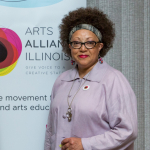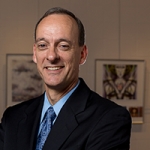Some Expressions about the Arts and Creative Expression

Charlie Jensen

Charlie Jensen

Gerald Yoshitomi

Elaine Maslamani

John Bryan
There is a gigantic, come-and-have-some, boatload of private sector money available to all arts organizations. New research from Richmond, Virginia confirms that most don’t ask for it.


This past September, I had the honor of being invited to the Americans for the Arts Executive Leadership Forum (ELF). ELF is where arts leaders running local arts agencies from all over the country come together for four inspiring days in Sundance, Utah. We are Executive Directors. Some of us are managing large city agencies with million-dollar budgets, some are managing mid-sized agencies, and some are managing small, but mighty, agencies such as mine in Oak Park, Illinois. While we are all different and a rather diverse group of people, we are indeed alike in many ways. Those that attend ELF become fast friends as we began the four-day journey. Each of us comes with the hope of exploring ways to become more effective leaders in our respective communities. This forum offers all participants the chance to share their stories, seek and give advice, exchange ideas, and learn from each other.
Read More

I have had the honor and pleasure of attending Americans for the Arts’ Executive Leadership Forum (ELF) three times in the last eight years. Without a doubt, these experiences have provided the best leadership and professional development in my life. The ELF is an opportunity for executive directors in the arts and culture field to come together for the opportunity of deep learning, reflection, and planning, all aimed at advancing the arts at the local level. Having several days to reflect, retreat, connect, and celebrate with colleagues who “get it” is a tremendous bonus that is both restorative and empowering. The quality of content carefully prepared by the Americans for the Arts staff helps ensure that each ELF provides the enrichment and reflection necessary to equip local arts leaders in what is often a busy and demanding life. The attention to detail and advanced reading material helps set the stage for a great learning opportunity.
Read More

As my time on Americans for the Arts’ Arts Education Council winds down, I’m given to reflecting on the power of “art-relationships.” Over the past three years, these relationships not only have benefitted me on a personal/social level, but also have elevated my professional expectations and performance. I’m grateful for the people I’ve met on the Arts Education Council, I’m honored to call them friends, and I’m appreciative that they’ve made me a more successful arts administrator. With my final council post for ARTSblog, I thought I’d share some insights I’ve learned as they relate to developing professional connections.
Read More

As I was preparing for my presentation at the upcoming National Arts Marketing Project Conference, I interviewed a number of bloggers, digital media experts, marketers, and influencers to get their take on the highs and lows of using social influencers to promote your products and experiences.
Read More

Social media has become a bona fide and critical component of the customer path to purchase—and arts marketers are taking advantage, successfully using social media to make their organizations more relatable, promote upcoming shows or exhibits, and gain memberships with special announcements and behind-the-scenes content.
Read More

My recent foray into professional arts marketing shows me that there’s much we can learn from each other on ways to link historically overlooked and disenfranchised communities with the mainstream theater communities who want to invite them in.
Read More

Arts organizations often find a delicate balance in planning a season that generates necessary revenue and attendance, while still being driven by a meaningful purpose. The ultimate goal is to provide opportunities rooted in a place of purpose, guided by your mission, that have the ability to reach a largest possible range of individuals.
Read More

An honest, unreserved commitment to community collaboration brings healing and positive growth. If your arts organization feels like their outreach and engagement is not as successful as they had hoped, remember these four key approaches to bring you back to the root of meaningful arts programming.
Read More

To communicate effectively, it really helps to know who you’re communicating with. As an arts marketer communicating on behalf of an organization, audience research is one of the most important tools we have to understand who our audiences are and what they want.
Read More

Comprehensive marketing planning will help you know your consumers better, which will help you maintain deeper connections and relationships with them. The process, while rigorous, provides the best way forward to understanding all the issues surrounding marketing efforts.
Read More

If you could attract neophyte audience members and get them to return by buying them a glass of wine, wouldn’t you do it? And if it was even easier to get them to the next step, becoming regulars—say, all it took was greeting them by name—wouldn’t you do that?
Read More

Try taking a youngster to a museum. It’s not easy. Where will you put the stroller? What about the crackers and the Cheerios? Such practical thoughts, and others like them, run through the minds of people who are interested in participating in the arts—but haven’t yet committed.
Read More

Every new season at a performing arts organization is like a road trip to a new destination. We’re experienced enough after taking these trips for years to know how to prepare and what to pack. But since the trip changes every year, there are still plenty of adventures (and challenges) to be had.
Read More

The individuals who are in the room when decisions are made can make all the difference to the following weeks and months of labor to build brand, engage the community, and develop future audiences. Here are a few helpful hints for you to make the case why marketing should be “in the room” to influence positive outcomes.
Read More

While the arts marketing landscape changes, and the methods are changing with them, some things will stay the same. This week, read tips, thought-provoking questions, and “lessons learned” from a broad range of professionals in our arts marketing blog salon.
Read More

I joined our new staff member in a meeting last week with a prospective grant applicant. We were discussing his interest and desire to get a new keyboard for his work as a musician. This young man humbly presented himself as he shared his professional and educational background that more than qualified him to apply for the developing artist grant we administer. Our new staff member did an excellent job reviewing the grant guidelines and preparing him for the process, but as the meeting was wrapping up, I saw that something was still missing.
“May I share an observation with you before you go?” I asked. “Sure,” the artist quietly replied.
Read More



Jessica Nuñez, mentor: Youth Development is essential in creating this concept of the third space—not home or school, but one that youth select on their own. Designing a safe space creates a collaborative learning environment that produces innovative ideas, lasting friendships, and strong ties to the institutions and organizations that provide these programs. I am a result of that mentorship and of the many opportunities the Explorers Program provided me.
Samantha Joseph, mentee: The word mentor is defined as “an experienced and trusted adviser,” and having a mentor who is a woman of color trust who you are and your abilities, regardless of your background, is something invaluable. Mentorship is more than being there for someone—it means you see them for who they are and help them achieve new heights; and lucky for me, I had the chance to experience just that.
Read More

Often, the pathways to job positions at the highest levels in the arts field are not very clear. The Diversity in Arts Leadership internship (DIAL) helps ensure undergraduates interested in leadership at arts organizations gain the skills, networks, and experience needed to assume leadership roles in the arts. Each intern in the Americans for the Arts’ DIAL Internship has displayed a combination of passion for the arts, some experience leading meaningful projects, and self-identifies as being from a background traditionally untapped for arts leadership. The DIAL internship then provides the platform for competitively selected undergraduates to explore nonprofit careers in the arts, taking the arts practices they love and combining them with meaningful experiences in business and leadership. While most internships can be considered experiential, the DIAL internship is a ten-week experience.
Read More

They say, “It takes a village to raise a child," but the need for a community of support doesn’t end after adolescence. As you move into adulthood, you have the opportunity to expand your village and seek out those who inspire you to join your team. But, before you welcome someone into your circle, you should learn what motivates them. Do they genuinely value the importance of sharing knowledge with the next generation, or are they driven by ego and status? If you are lucky enough to find a mentor who wants to see you succeed for purely altruistic reasons, welcome them with open arms and do everything you can to keep them close.
Read More

Over the past two summers, I have had the unique privilege to work with three incredible mentees through the internship program here at Americans for the Arts. With all three of these individuals, I worked hard to impart much of my knowledge about arts education, the nonprofit arts sector, the inner working of Washington, D.C.’s advocacy infrastructure, and much more. However, it was through these unique relationships that I also learned from them and grew as a person; we were engaging a process of cyclical mentorship. Often, we approach the leadership pipeline in the field as a departing of knowledge from the older generation to the younger. This process, though utilized effectively in the cultural sphere, leaves much to be desired. As we work together in the field, we must be aware of our own advancement in the pipeline and how we are interacting in relation to other operating alongside us.
Read More



Dennie Palmer Wolf, mentor: I have half a century of work in the arts field behind me: successes, publications, and big, noticed projects, right along with my full share of mistakes, disasters, and misjudgments. When I speak nowadays I claim my white hair as a badge of office and call myself a “crone emeritus.” I started down that “remembrance road” and then thought, “For what?” Better to pass it on actively—why not mentor a next generation of leaders?
Sanuja Goonetilleke, mentee: I am lucky to have had multiple mentors in my life. Each is a double reminder: first, I am not alone and second, I have a responsibility to the world to pass the torch on. This is not only the torch of mentorship, it is also the torch of doing the work that my mentors have done and continue to do. It is more than knowledge; it encompasses showing up (with a smile), making an effort, pushing oneself to do one’s best, and keeping faith with what gradually becomes our shared work.
Read More

While helping with research for Americans for the Arts’ Emerging Arts Education Leadership toolkit, I was able to find the true potential in the reciprocal exchange and cyclical mentorship of arts leaders in the field. Originally, I came to this project as just an artist and, therefore, a believer in the power of the arts, but I knew very little of the landscape and infrastructure of support for the arts in my region or my nation as a whole. I lacked that knowledge of how to create coalition as an arts leader, how to inspire others to action in the best way, or that there was even a cycle of mentorship that could tap into. Through this project, I realized how many resources and how much support there really is (and how much support there can be) for the intersections of identity and culture within arts education programs in America.
Read More